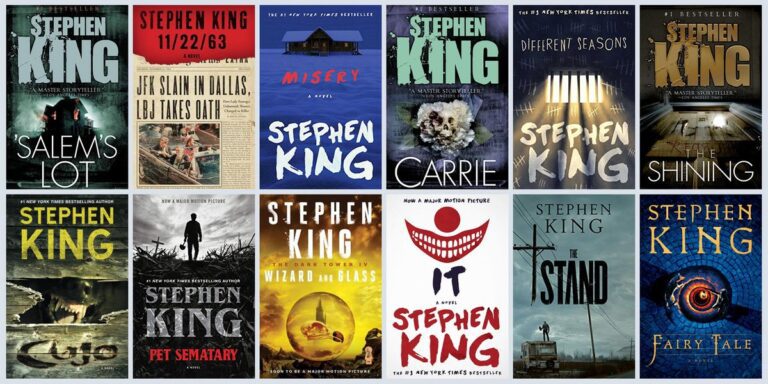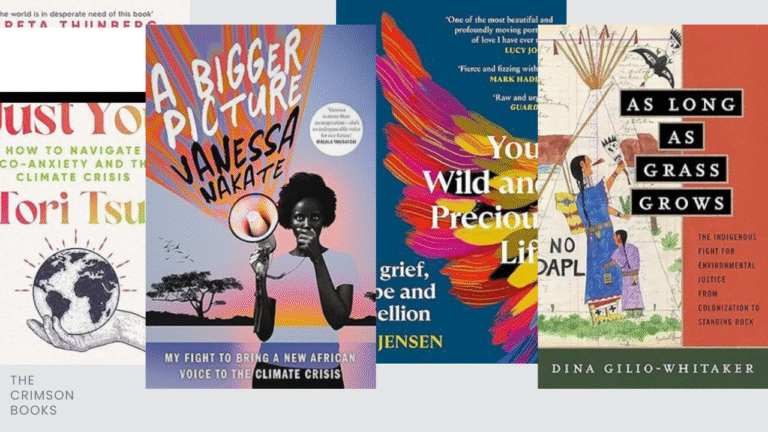10 Best Indian Authors to Read Once in a Lifetime
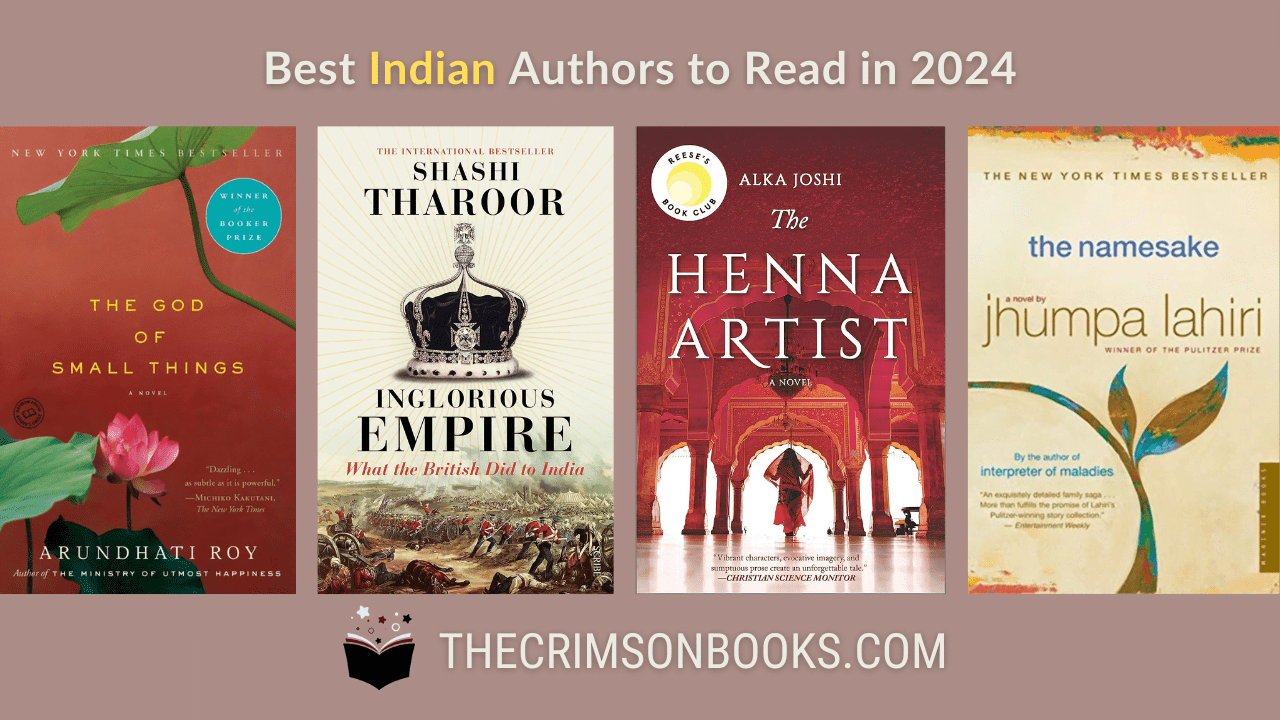
Discover the literary treasures of India with our curated list of the ‘Best Indian Authors’ to read in 2024. From timeless classics to contemporary masterpieces, explore the diverse voices that have shaped Indian literature. Uncover the brilliance of renowned writers, their impactful storytelling, and the rich cultural tapestry woven into each narrative. Whether you’re a seasoned reader or a newcomer to Indian literature, this blog post is your guide to the must-read works that showcase the depth and beauty of Indian storytelling.
Books by Best Indian Authors
1. Train to Pakistan
Ten million people—Muslims, Hindus, and Sikhs—were on the move when the new state of Pakistan was publicly established in the summer of 1947. Nearly a million of them had perished by the time the monsoon arrived, and everyone in northern India was either hiding, in fear, or in arms. A few small towns tucked away in the furthest corners of the boundary were the last remaining havens of tranquility. Mano Majra was a village among them.
At the outset of this timeless book, Khushwant Singh continues, “It is a place where Sikhs and Muslims have lived together in peace for hundreds of years.” The community gets its first taste of the horrors of the civil war when the “ghost train,” a silent, magnificent burial train filled with the dead of thousands of refugees, comes one day at the end of the summer. The narrative of this remote community submerged in a sea of religious hatred is told in Train to Pakistan. It also tells the tale of a Muslim girl and a Sikh boy whose love endures and surpasses the devastation caused by conflict.
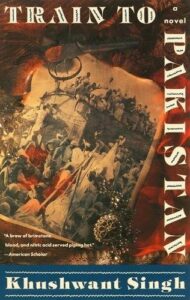
2. Midnight’s Children
On August 15, 1947, at exactly midnight, Saleem Sinai was born—the exact day India gained its independence. Saleem is welcomed by fireworks, enthusiastic spectators, and Prime Minister Nehru personally. However, when he becomes older, he discovers the sinister ramifications of this coincidence. His every action is reflected and amplified in circumstances that affect the direction of national affairs; his existence is intrinsically linked to the history of his country; and his health and well-being are inexorably linked to that of his nation. The telepathic abilities that connect him to the 1,000 other “midnight’s children” in India—all of whom were born in that first hour and possess magical abilities—are arguably the most amazing.
This book is a masterful expression of the universal human comedy that is also an intriguing family saga and an astounding evocation of a large region and its people. Even after four decades of publication, Midnight’s Children continues to be regarded as a seminal piece of fiction and a masterful reading by one of the greatest authors of our day.
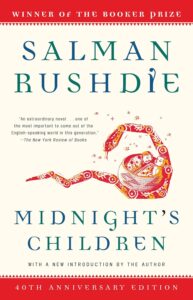
3. A Suitable Boy
A Suitable Boy paints a broad, panoramic picture of a complicated, multiethnic society in transition by telling the tale of common people entangled in a web of love, ambition, humor, grief, prejudice, reconciliation, the most careful social graces, and the most horrific brutality.
The central theme of Vikram Seth’s book is love: it tells the story of Lata and her mother Mrs. Rupa Mehra’s search for a suitable boy for Lata, whether through strict parental evaluation or affection. This engrossing story immerses us in the vividly imagined world of four sizable extended families during the early 1950s in a newly independent India that is going through a difficult period. It tells a captivating account of their lives and loves.
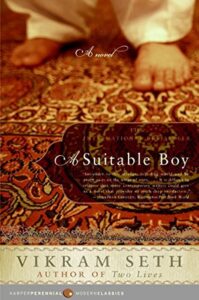
4. The God of Small Things
The God of Small Things offers such magic, mystery, and sadness that, literally, this reader turned the last page and decided to reread it. Immediately. It’s that haunting.
—USA Today
Arundhati Roy’s contemporary masterpiece, which has been compared favorably to the writings of Faulkner and Dickens, is a potent blend of political drama, forbidden love story, and dramatic family history. The arrival of their stunning baby cousin, Sophie, completely upends the world of the seven-year-old twins, Rahel and Estha. This incident will reveal “big things [that] lurk unsaid” in a nation teetering perilously near instability, as well as an illegal relationship and unintentional and intentional disasters.
The God of Small Things is a lush, lyrical, and unsettling Booker Prize winning classic that launched the author’s illustrious career of fiction and political criticism, which is still going strong today.
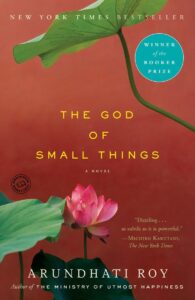
5. Partitions
Stunning debut book about uprooted kids and their escapes to safety, set in India during the bloody 1947 partition. As India is split into two countries, there is communal violence on both sides of the newly drawn boundary, and hordes of migrants are fleeing the chaos and bloodshed.
Twin Hindu boys Shankar and Keshav lose sight of their mother at an overrun rail station and join the throng of people searching for her. Simran Kaur, a young Sikh girl, has fled her father because he would sooner poison his daughter than see her violated.
And as he hobbles toward the newly formed Muslim nation of Pakistan, Ibrahim Masud, an aged Muslim physician, rediscovers his calling as a healer. He was driven from his hometown. This odd trio bands together as the displaced endure a range of tragedies, breaking every self-preservation guideline to create a hopeful future.
Partitions, a dramatic, brilliant tale of families and nations torn apart and rebuilt, presents a remarkable novelist with the power and elegance of a poet.
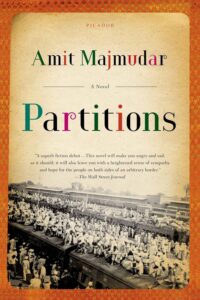
6. The Henna Artist
Captivated me from the first chapter to the final page.
—Reese Witherspoon
The Henna Artist opens a gateway into a world that is simultaneously lush and interesting, stark and merciless. It does this through painting a vivid and captivating portrayal of one woman’s battle for fulfillment in a culture that is veering between the traditional and the modern.
Lakshmi, 17, leaves her violent marriage behind and travels alone to Jaipur, a brilliant pink city from the 1950s. There, she becomes the most sought-after henna artist and confidante among the upper-class, wealthy women. But she can never divulge her own as she is trusted with the wealthiest people’s secrets.
Lakshmi is well-known for her unique designs and wise counsel, but she has to exercise caution to stay away from envious rumors that could destroy her reputation and her business. One day, while she pursues her dream of living a self-sufficient existence, she is shocked to see her husband standing in front of her after all these years, bringing along a lively little girl who is her sister, a sister Lakshmi never knew she had.
All of a sudden, the prudence she has painstakingly cultivated as defense is called into question. She continues to persevere, using her gifts and encouraging everyone around her in the process.
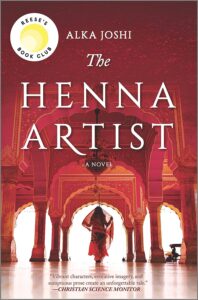
7. Inglorious Empire
India’s economic contribution to the global economy was equal to that of Europe in the eighteenth century. After 200 years of British domination, by 1947, it had dropped six times. In addition to enslaving people and using deceit, the Empire also slaughtered defenseless protestors, blew up rebels with cannons, institutionalized bigotry, and starved millions of people.
Shashi Tharoor challenges British imperialism’s justification of itself as enlightened tyranny serving the interests of the governed by showing how every purported imperial “gift,” including the rule of law and the railways, was created only with Britain’s interests in mind.
He continues by demonstrating how India’s deindustrialization and the devastation of its textile sector served as the impetus for Britain’s Industrial Revolution. Tharoor uncovers the disgraceful truth of Britain’s tarnished Indian heritage with striking effect in this audacious and perceptive reevaluation of colonialism.
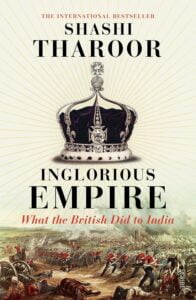
8. Annihilation of Caste
The political essay “Annihilation of Caste,” written by Dr. B.R. Ambedkar, a well-known political figure, eminent jurist, Buddhist activist, philosopher, anthropologist, historian, orator, writer, economist, scholar, and editor, was first published in May 1936 and spoke out against the caste system and Hindu orthodox religious leaders.
Throughout his life, Dr. Ambedkar battled for the rights of the Dalits and other socially oppressed groups, as well as the abolition of societal evils like untouchability. Jawaharlal Nehru chose Dr. Ambedkar as India’s first Law Minister in his Cabinet. 1990 saw the posthumous awarding of India’s highest civilian accolade, the “Bharat Ratna.”
One of the most important—yet little-known—pieces of Indian political literature is this one. It is a fearless critique of Hinduism and the caste structure. Ambedkar provides an academic analysis of Hindu texts, which support a rigidly hierarchical and immoral societal structure. Mahatma Gandhi, the most well-known Hindu in the world, openly addressed the provocation.
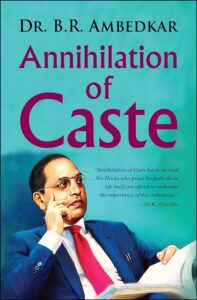
9. The Night Diary
A gripping, nuanced story of the human cost of conflict appropriate for both children and adults.
-Kirkus, starred review
A moving, intimate, and hopeful story of India’s partition and one girl’s quest to find a new home in a split nation, in the style of Inside Out and Back Again and The War That Saved My Life.
1947 saw the division of India, which had just gained independence from British domination, into Pakistan and India. Thousands of people are killed crossing borders each year as a result of the division that has heightened tensions between Muslims and Hindus.
Half Hindu, half Muslim Nisha, twelve, no longer knows what her nation is or where she belongs. Nisha and her family flee to Pakistan after Papa determines it is too dangerous for them to remain there. Initially, they go by train, but eventually, they walk to their new home.
Nisha can’t imagine losing her homeland as well, especially after losing her mother when she was a kid. The journey is lengthy, challenging, and hazardous. Despite the fact that her nation has been destroyed, Nisha maintains hope that she will be able to rebuild herself.
The Night Diary, narrated through Nisha’s letters to her mother, is a poignant account of a young girl’s search for her own identity, her home, and a bright future.
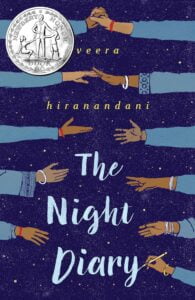
10. The Namesake
Dazzling…An intimate, closely observed family portrait.
—The New York Times
Meet the Ganguli family, recent Calcutta immigrants who are yearning to return home despite their best efforts to assimilate into American society.
The name they give their newborn child, Gogol, represents all the tensions that arise from upholding tradition in a foreign land—tensions that will follow Gogol throughout his own tortuous journey through betrayed allegiance, hilarious digressions, and heartbreaking love affairs.
Pulitzer Prize winner Jhumpa Lahiri masterfully captures the experience of immigration and the complex relationships across generations in her book The Namesake.
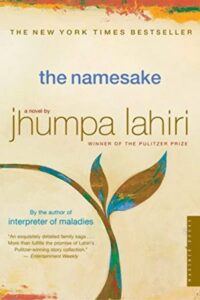
More Historical Fiction Books
- The Lost Apothecary by Sarah Penner
- The Things We Cannot Say by Kelly Rimmer
- The Hotel Nantucket by Elin Hilderbrand
Disclaimer: This blog post may contain affiliate links. If you click on these links and make a purchase, The Crimson Books may earn a small commission at no additional cost to you.
About the Author

TCB Team is a dedicated group of individuals who are passionate about literature and committed to critically analyzing and evaluating various literary works. The team consist of diverse members with varying backgrounds, interests, and expertise, which allows for a comprehensive and multifaceted assessment of books across different genres and themes.
Our primary goal is to provide insightful and unbiased reviews that help readers make informed decisions about their reading choices and contribute to the broader discourse surrounding literature.





